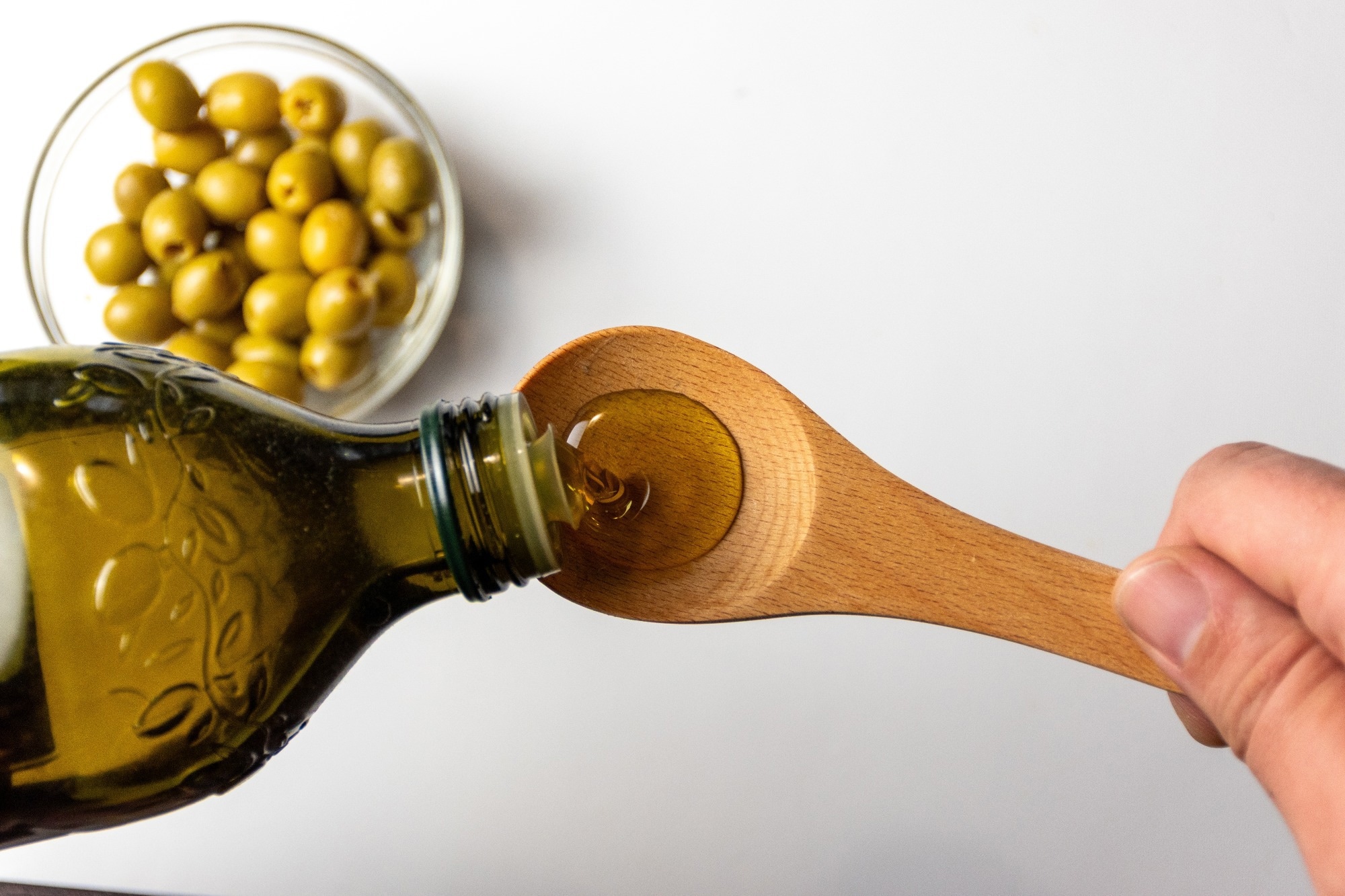A large cross-sectional study reveals that incorporating extra-virgin olive oil into a regular diet is associated with lower waistlines and improved metabolic health, reinforcing its central role in Mediterranean-style eating.

Study: Regular extra-virgin olive oil intake independently associates with lower abdominal obesity. Image Credit: Mehes Daniel / Shutterstock
In a recent study published in the journal Frontiers in Nutrition, researchers investigated the specific role of extra-virgin olive oil (EVOO), a key component of the Mediterranean diet, in its association with abdominal obesity. The study leveraged a substantial sample cohort comprising data from over 16,000 adults to estimate the association between the frequency of EVOO consumption and abdominal obesity metrics.
Study findings revealed that regular EVOO consumption was independently associated with lower body mass index (BMI) and waist circumference (WC). Furthermore, participants demonstrating irregular or low EVOO consumption were observed to have five times higher odds of being classified as having abdominal obesity than their EVOO-adherent counterparts, indicating EVOO’s combined influence as a mediator of part of the Mediterranean diet's association with waist circumference and as an independent factor associated with waist circumference.
Background
Abdominal obesity, the accumulation of fat around internal organs, is a major public health concern. Decades of research have established this condition's strong link with several severe chronic diseases, including cardiovascular disease (CVD), type 2 diabetes (T2D), and cancer, highlighting the importance of enhanced surveillance and early diagnosis.
Body mass index (BMI), the ratio of an individual's height to weight, has conventionally served as a proxy for overall adiposity, whereas waist circumference is the more reliable indicator of central adiposity. While BMI remains a useful measure of overall weight, WC is a more direct and accurate indicator of visceral fat.
Research has increasingly focused on strategies to manage abdominal obesity, with evidence highlighting the importance of lifestyle changes, particularly diet, as key components of effective management.
The Mediterranean diet (MedDiet), which emphasizes plant-based foods and extra-virgin olive oil (EVOO) as the primary source of fat, is widely recognized for its cardiometabolic benefits. EVOO is rich in monounsaturated fatty acids and antioxidant polyphenols such as hydroxytyrosol and oleocanthal, which reduce inflammation and support metabolic health.
Despite EVOO’s rising popularity in cuisines beyond the MedDiet, research has not yet separated EVOO’s specific benefits from those of the broader MedDiet pattern.
About the study
The present study sought to clarify this knowledge gap by providing consumers with a clearer view of whether habitual EVOO intake frequency is associated with BMI and waist circumference within the Chrono Mediterranean Diet Score (CMDS) framework, rather than only within the traditional MedDiet.
The study analyzed data from 20,784 respondents who completed an online questionnaire survey based on the CMDS, a metric that assesses adherence to a Mediterranean-style diet while also incorporating chrono-nutrition principles such as the timing of food intake. Screening protocols that included only adults (age ≥ 18) resulted in a final dataset of 16,273 participants (8,712 females).
The questionnaire also collected data on sociodemographics (age, sex), morphometrics (height, weight, waist circumference), and detailed dietary habits. Based on their self-reported intake of about two tablespoons (~25 g) of EVOO per day, participants were categorized into three groups: "sporadic" (fewer than 3 days/week), "frequent" (3 to 5 days/week), or "regular" (6 or more days/week).
Statistical analyses were conducted to examine the associations between EVOO intake frequency, anthropometric measures (BMI and waist circumference, WC), and overall CMDS adherence across categories. Analyses included analysis of variance (ANOVA) and multivariate logistic regression models.
Study findings
The present study revealed a clear, dose-dependent association between EVOO intake and metabolic health. Participants reporting regular EVOO consumption demonstrated a significantly lower average BMI (24.7 kg/m² versus 26.6 kg/m² [p < 0.001]) and waist circumference (89.1 cm versus 99.4 cm [p < 0.0001]) than their sporadic intake-reporting counterparts.
A mediation analysis showed that a substantial portion (61.9 percent) of the association between Mediterranean diet adherence and waist circumference was mediated through the consumption of EVOO. The oil also demonstrated a direct association with waist circumference, independent of the overall diet score (β = -0.59, p < 0.0001).
Logistic regression analyses revealed that, after adjusting for age, sex, and overall diet quality/CMDS score, individuals who did not consume EVOO regularly were five times more likely to be classified as having abdominal obesity compared to regular consumers (Odds Ratio [OR] 5.1, 95 percent Confidence Interval [CI] 3.3–6.8, p < 0.0001).
Conclusions
This large-scale study provides evidence that regular EVOO intake is independently associated with lower BMI and waist circumference in this cross-sectional sample. The oil was further identified as a key mediator of Mediterranean diet adherence effects, strengthening the dietary pattern's positive associations.
The considerably higher risk of abdominal obesity among non-regular consumers supports existing guidance to include EVOO within healthy dietary patterns, while future longitudinal and randomized studies will be necessary to establish causality.
This cross-sectional, self-reported survey in a predominantly European sample cannot infer causality, residual confounding and measurement error remain possible, and some socioeconomic variables were not captured.
Journal reference:
- De Matteis, C., Crudele, L., Di Buduo, E., Cantatore, S., Novielli, F., Cultrera, S., Tricase, A. F., Arconzo, M., Florio, M., Gadaleta, R. M., Piccinin, E., Cariello, M., & Moschetta, A. (2025). Regular extra-virgin olive oil intake independently associates with lower abdominal obesity. Frontiers in Nutrition, 12. DOI – 10.3389/fnut.2025.1645230. https://www.frontiersin.org/journals/nutrition/articles/10.3389/fnut.2025.1645230/full